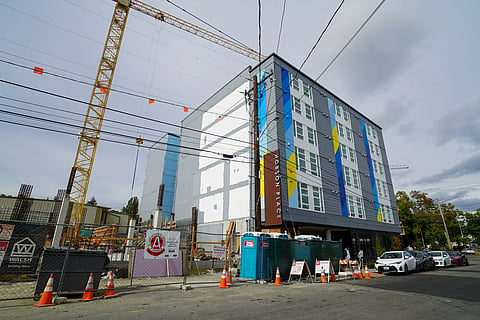Hobson Place Aims to Provide Housing Alongside Vital Services
by Elizabeth Turnbull
Next week, residents will move into the first phase of a new supportive housing project in South Seattle called Hobson Place. Located in Rainier Valley south of Judkins Park, the site consists of 85 housing units and will eventually include a clinic specifically designed to help individuals who are without homes — providing care for both medical and behavioral health needs.
Residents of the new housing units who are looking for help with behavioral health disabilities, such as mental health issues or addiction, will have access to mental health professionals, case managers, and social workers, as well as an on-site residential staff team that is in the building 24/7.
"The population that we focus on serving tends to have disabilities that sometimes include those physical types of things but that are more the behavioral health realm. The kind of accomodation that those folks need is support," said Daniel Malone, Executive Director of the Downtown Emergency Service Center (DESC) "That's why our staff are here."
DESC as an organization specializes in providing housing and mental and behavioral health resources to individuals who are without homes in Seattle. Phase two of Hobson Place, which will be completed in late 2021, will be the first clinic of this size to specifically meet the needs of people living with disabilities and homelessness in Washington state. And services will not be limited to residents. Overall, the clinic is set to serve 10,000 community members each year, in addition to those living in the housing units.
The supportive housing portion of the development will ultimately consist of 177 studio units, and residents moving into the 85 newly opened housing units each have their own bathroom, kitchen, bed, and dining area. While DESC owns and operates both the clinic and the housing complex, the clinic is based on a partnership between DESC and Harborview Medical Center in order to provide behavioral health care alongside medical care for physical health concerns.
The need for mental and physical healthcare for individuals experiencing homelessnes has become increasingly apparent as the number of individuals without homes has increased in Seattle and King County since last year.
Though the number of Seattle/King County residents experiencing homelessness at the beginning of 2020 was fewer than in 2018, this number increased 5% since 2019. This means that on the morning of January 24, 2020, over 11,700 individuals were without homes in the Seattle area, according to a 2020 report.
Notably, the greatest percentage — 16% of the individuals surveyed in the report — cited alcohol or drug use as the reason they were chronically without stable housing, while the second most-cited cause for houselessness was mental health issues, at 14%.
Like any disability, behavioral health issues can make maintaining employment and a steady income incredibly difficult or impossible for some people. Oftentimes, government aid is not enough for these individuals to pay rent.
"If you have a disability, you're almost always going to be living on a fixed income," Malone said. "And our country, our society, has decided that's going to be a low dollar amount."
Residents living in the phase one housing units at Hobson Place, which is located at 1911 22nd Ave. S., can reside there as long as they want, and the cost of rent varies based on each individual's income. Those who do not have an income are not required to pay. In addition, residents can decide whether or not they want to utilize the mental health resources built into the facility.
While the clinic is still under construction, when it opens, it will provide medical care for physical ailments alongside behavioral healthcare, such as psychiatric care or help with addiction. Malone said the hope is for the clinic to be a safe space for people to seek out behavioral health care even if they might normally be reluctant to go to a traditional clinic or hospital.
New residents of the housing units at Hobson Place will begin the transition of moving into a home of their own next week.
Malone has helped coordinate the move-in process at other facilities in the past, and he says it can be an emotionally complicated time as residents become comfortable with their own personal space. While a warm shower and a door to close can feel healing for many residents, a few new renters in the past have opted to sleep on the floor or have had to slowly increase the number of nights they stay in their new apartment.
Malone says he hopes the experience is ultimately cathartic for residents.
"Just that sense of relief is the thing that I relish the most that people get," Malone said.
Elizabeth Turnbull is a Seattle-based journalist.
Featured image by Susan Fried.
Help keep BIPOC-led, community-powered journalism free — become a Rainmaker today.


